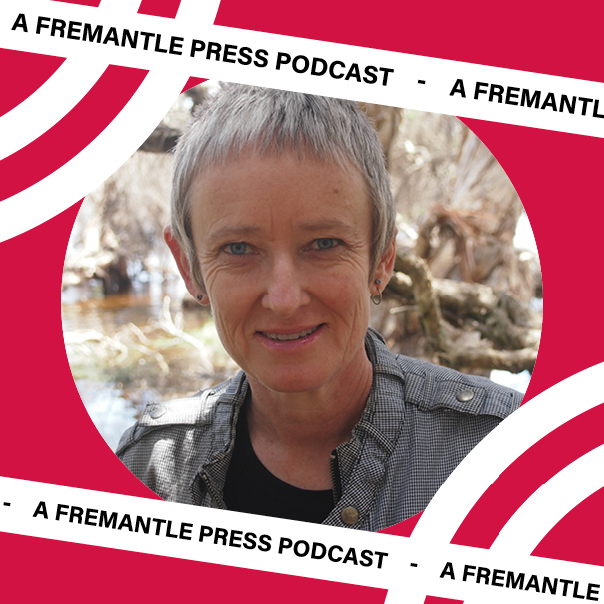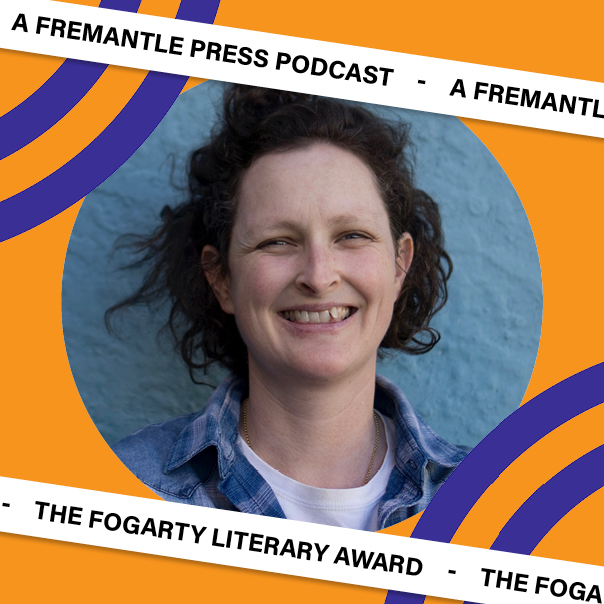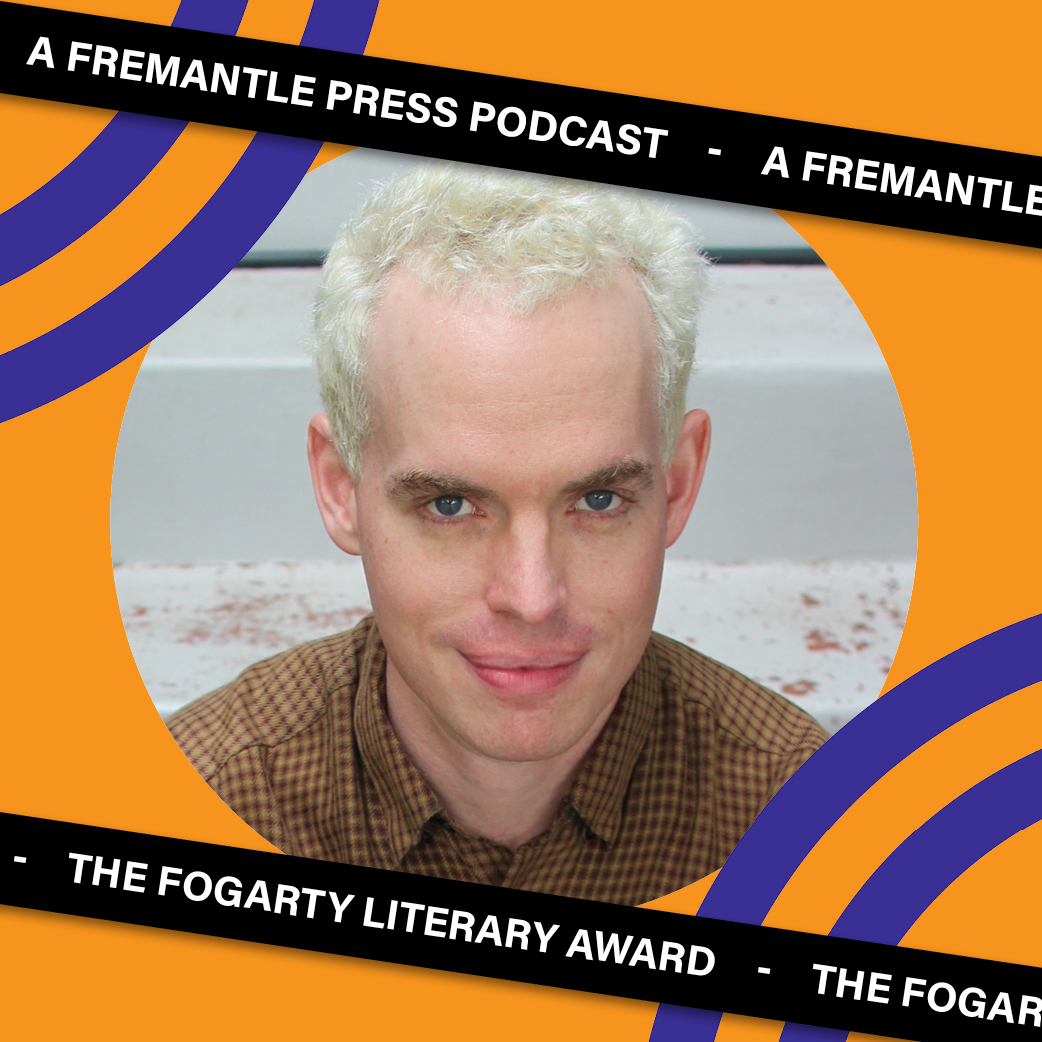Episode Transcript
Speaker 1 00:00:07 Hello, and welcome to this special city of Freemantle Hungerford award edition of the Freemantle press podcast. Today, we are recording on <inaudible> in wajanja and I'd like to acknowledge our first storytellers along with the <inaudible> elders past present and future. My name is Maria PaaS. My novel skimming stones won the city of Freeman Hungerford award in 2020. I'm delighted to be asked to help introduce you all to the next round of Hungerford writers. Those four shortlisted writers waiting expectedly for the announcement of the winner on Thursday, the 20th of October, when I think back now, I remember being so nervous. I didn't yet realize how life changing this award would be for me. Today's guest is Jared McCann, whose manuscript is a memoir called tell me the story. And at this point I'd like to let you know that today's podcast does include a depiction of abuse. So listener discretion is advice. First up, we ask Freeman, press publisher, Georgia Richter, to describe why she chose this manuscript for the short list.
Speaker 2 00:01:18 I think that memoirs, that document traumatic and difficult life events are particularly difficult to get, right? Because the Rita has a certain resistance to embarking on such a journey. But that said, I found Gerard McCann's tell me the story, a really compelling read. And it reinforced for me how, when a story is well told anything is possible, and this memoir has a sense of openness and transparency. And it's also really got the sense of someone who is in control of the narrative so that it is not a victim's story, but it is a survivor's story. And that's really triumphant. And you get the sense that also this is a tale that's born of long reflection and processing. So it's perceptive and generous and insightful, and I really loved it.
Speaker 1 00:02:16 And now let's hear from the writer himself, Jared McCann grew up in the suburbs of Perth in the 1950s and sixties. He studied architecture at UWA and practiced in the profession for many years. During that time, he has always written, studied English, literature, postgrad, and belonged to small writing groups. Welcome Jared, and congratulations. I want to start by asking you to tell us something about yourself. That's not in your writing bio.
Speaker 3 00:02:48 Well, I've had counseling and therapy on and off properly most of my life, but during most of that, uh, the issue of childhood sexual abuse remained pretty well, concealed and protected. I looked after the secret and it was only exceptional trauma therapy at the sexual assault resource center in Subi that allowed the reintegration really of whole parts of myself that had been, um, submerged or lost since childhood. I also had, uh, Y on psychotherapy and dream analysis many years, and this has enabled me to have an intimate relationship with my psyche, so that, uh, I'm very conscious of dreams. And I see them as my inner poetry, if you like the enigmatic kind of, uh, Mo metaphors that are what I think are an essential part of being alive. And I use them to guide me in kind of a subtle way. I've also had a long and supportive marriage. And I think that few men who have been sexually abused as children could probably survive the outing of their secret without the support and empathy of a close friend or a partner. Well also love camping in the Bush, sleeping under the stars, brewing coffee on fires. But most of all, I love sitting on the floor with my grandchildren and entering into their imaginative worlds, uh, traveling with them to wherever their minds leave them, uh, which I find is always to a place of wonder
Speaker 1 00:04:35 Jar. You've ridden a narrative non-fiction and it's a very personal piece. Could you please begin by telling us more about your manuscript?
Speaker 3 00:04:45 Uh, it was sexually abused over many years by, uh, the assistant priests at my parish in colo. And then later when he was transferred in quarantine, the sexual abuse is not just a physical trauma of course, but a psychological call assault that is almost impossible for most people to fathom. And its core is the secret, uh, that the child is compelled to enter into. And the secret both paralyzes this child's psyche, as well as destroying their capacity for relationship with their parents who should be there of course, to help disentangle the world's traumas. The simple act of the priest telling me that I could not tell them in effect disabled, my trust and relationship with them, which was severed the first day of the abuse. And unfortunately never recovered. And this inability to trust has created down through my life and in all my relationships professionally and personally.
Speaker 3 00:05:46 And I begin in the manuscript really by discussing this at length, but the simple act of writing the story was also the beginning of the peeling of the onion. If you like the layer after layer of not just the traumas, but the insights that followed on how the child and then the adolescent, and then the adult had been emotionally and psychologically disabled. Um, this process also exposed the reasons behind so much of the angst and dysfunction in my family, uh, which was so profound that I speculate that it contributed to my mother's mental breakdowns. Um, in this sense, I suppose my abuse became secondary to the disintegration of her mental health and our family cohesion, which became center stage. And I was able to document some of this and in fact, quite a bit of this with some pretty basic but honest poetry, which I was given to writing as an adolescent.
Speaker 3 00:06:52 Uh, and now come in writing this manuscript. I found that the poetry, which I still have was in, in effect an authentic recollection of the events at the time. Um, but perhaps because I've had an extraordinarily gifted supported and empathic wife, Sue, and also exceptional sexual abuse therapy, I've been able to integrate these events less as a victim and more as an interest observer. And this has allowed me to, um, explore if you like who the priest was, his world and his victims. And although some of this exploration was freshly traumatizing, it also started another profound journey which was meeting and uncovering the many stories of other boys who'd been abused by the same priest I came to realize then that my writing of the manuscript was not just the documentation of my experience, but also the honoring and validation of that, of so many others. And then I realized that I was writing that not just for myself, but for the hundreds of other boys who had and were still suffering and who in effect were continuing their disabled lives. Uh, the manuscript also documents at length, my pursuit of justice through the Catholic church and the process, the Royal commission and my involvement in it. And this occupies probably about one of the, of the work.
Speaker 1 00:08:25 We're so grateful to you for this extract with us from tell me the story. Will you please start when you
Speaker 3 00:08:35 Arrived unannounced just before time he stood just inside the vestibule. I felt the sudden deflation as the air was sucked out of me, our secret instantly resurrected. My mother had no reason to refuse him, especially as we were about to sit down for dinner, she stretched the meal eight ways or went without herself to include him. His presumptuous begged belief. When I reflect on what our family were enduring so soon after granddad's death and the court proceedings, a dining table was octagonal 1960s lax with a red and white scatter pattern and Chrome leagues. It sat in the middle of the vestibule. The spare space at the table was opposite. My father and leig sat himself there next to me. He said, grace. And as it as had happened previously on the AAR, I realized he was looking at me, remote and watchful, the usual chatter and shying of my brothers took on a greater volume.
Speaker 3 00:09:36 Each of them talking over the others to impress father. When dinner was finished, he became the showman telling stories and jokes. And we all laughed as his narrowed eyes roamed the table back and forth. I watched those BDIs. I remember five visits in his grooming of the family. Each time you performed a new chest on the first visit, he gave a slideshow of a trip he'd made with a fellow priest across the ible plane. He brought his own projector and we watched the pictures on the vegetable wall. One was taken from the passenger seat inside the car. He was at night and showed a flared match, lighting a cigarette, lighting up his face. As he was driving the car. He warned us that the flare from the match temporarily blinded him. He was teaching us safe drive-in habits on two visits. He did the Craven, a rocket trick, carefully disassembling, an empty Craven, a cigarette packet.
Speaker 3 00:10:36 He spread the aluminium foil in a lining flat on the table. Then taking the tissue paper that incase cigarettes, he folded into a Constantina shape, standing this on its end on the aluminum foil. He lit the tissue. The flames burnt down until all that was left was the gossamer thin Ash still intact and upright in its Constantina form. The weightlessness of the tissue Ash in the rising column of hot hair caused it to rise quickly like a rocket until it nearly hit the ceiling. Do it again, father, we all shouted. He arrived another evening. It did farm as usual. And again, unannounced carrying a small dusky pink canvas carry bag, which he put on the floor beside him at the table. It was a typical meal. My brothers all talking at once vine for his attention, Dom whose nickname was talkie. Talkie was the loudest.
Speaker 3 00:11:34 Both he and Patty were young and impressionable keen to have a voice over us. Domine three older brothers when we'd finished and the empty plates were cleared away. He lifted the carry bag onto the table and showed us. He contained a portable tape recorder, a brand new battery operated Grundy real to real. It was the first we'd ever seen. I've had my housekeeper. So the microphone into this invisible pocket, he said pointing at the small black dots, surrounded by pink stitching on the outside of the bag. It had been running since he arrived recording our meal together, we gathered round leaning over the table and listened again to our chatter. The meal had sounded like chaos. Each of us clamoring to be heard above the other, especially Don the dinner table was his stage and his chatter was hilarious. We all thoroughly approved of lone each's trick V sat through it all UNS, smiling detached in his inscrutable way.
Speaker 3 00:12:37 Scanning our faces still left to right left to right. He didn't approach me in the house nor single me out for special attention. It was not. And it was not in my nature to be insulin or disrespectful or do anything that might betray my secret. Nothing awkward or distressing had happened. So I laughed along with everyone else conscious though, I've been separate from them. All the only relationship that existed at the table was between nig and I. Our secret was an invisible, tight chord, and I enjoyed its tension, rarely watching his eyes roam back and forth. He was like a sor mesmerizing, the whole family,
Speaker 1 00:13:20 Gerard. This is an important story. And your work has the potential to resonate with readers who may have had similar experiences, but who may not also be in a position to articulate that experience themselves. How does it feel to see your story on the city of Freeman or Hungerford award shortlist?
Speaker 3 00:13:40 Despite my previous writings been enjoyed by friends and family and the fulfillment that writing this mens group has brought. And despite the encouragement of my writing group, I never credited myself as been a writer per se, that voice over my shoulder kept whispering. You are a fraud don't kid yourself, but being shortlisted for the Hungerford award, however, is like a litter neon sign flashing across the sky saying, you can write, you can write someone is saying this officially and you can trust them apart from that, it more importantly validates this story and it's telling, and the honest honesty and the fearlessness and in the end justice for these boys and the, their dealings with the Catholic church,
Speaker 1 00:14:31 Your bio note indicates that you've always written alongside another career entirely. Tell us about having two careers and how they work in parallel to one another.
Speaker 3 00:14:43 Well, although I've always had a professional career as an architect and would have to say modestly that I've been reasonably competent at it. I've never felt as though I was an architect in the sense that Carrie hill, the ferment architect once said that he was an architect, like a dog was a dog. Um, and I, when I heard that, I realized that I actually wasn't an architect that I had never felt that, and in a way never would that it was always a default position for me. Uh, and that when I was, uh, start I'd started writing, um, really as an adolescent writing poetry and then short stories. And then when I started traveling as a 20 year old, uh, writing extensive, um, diaries that became manuscripts in themselves in those days, and then subsequently short stories and then writing groups. So the writer was always, uh, sublimated by, by the professional on the surface.
Speaker 3 00:15:48 And although architecture economically and professionally, uh, sat on top the writer underneath never felt like it had been given any validity, certainly by not by myself and although friends and, um, writing group and fellow members always said, you are a good writer. I never actually believed it for myself. And so I hovered in this, um, never world really between not really feeling like an Arctic and not validated as a writer. And so winning the, uh, becoming on the shortlist rather for the Hungerford has, um, in, in a way validated that other part, which is the writer, uh, when my wife Sue and I came back from traveling in Europe in the early, uh, mid 1970s, we moved to fer Antle cuz it was the only place in Perth that we felt somehow embodied, uh, the spirit of what, where we had lived in Europe. But also we were both felt marginalized both from our families and from society, from our personal experiences.
Speaker 3 00:17:13 And so ferment was a place that somehow supported the marginalized. And of course this was also the case with the arts. So, um, the early theater groups, desperate measures, the real artists, the communities, and then the ferment arts center opening up was ferment always seemed to us to embody who we were, which were fringe pillars, both, um, from a cultural point of view, but also from, um, uh, a traditional Western middle class upbringings, which we'd had. And so we have always felt part of ferment and have always lived in ferment and wouldn't live there and anywhere else. Um, and that, uh, the we've always felt that then that the, the fact that the city has supported its art community in that way, um, would be the reason that, um, the, the Hungerford award for me is an embodiment of the support for writers, uh, in the same way that the, um, print award and those who have supported the visual arts, I'd like to, I think acknowledge my family.
Speaker 3 00:18:34 Um, I've been privileged enough, um, economically and psychologically to have a career. Um, but also that enabled me to have time off, to write when I did, but that none of that would've been possible if my wife Sue and our children had not been 100%, uh, on the page with me and supporting me through the ups and downs and I have to say some fairly extensive downs. Um, but that, uh, there support really enabled me to keep going. When sometimes it felt like, uh, I was beating my head against the wall. Um, and in that process, of course, uh, it, for me having children and that supportive family has been a redemption. And in the process, I feel like I have rediscovered, um, whole aspects of my own childhood, which prior to the abuse was very happy. And one of the reasons now I enjoy so much sitting on the floor with grandchildren being in a way back, able to be back in that world of innocence.
Speaker 1 00:19:44 Gerard, thank you for being here and sharing your work with our listeners listeners. You can meet Gerard McCann at the 2022 city of Freeman Hungerford announcement at Freeman arts center. On Thursday, the 20th of October tickets are free and available from the Freeman press website or event bright I'm Maria. And I look forward to joining you in our next Hungerford podcast.


